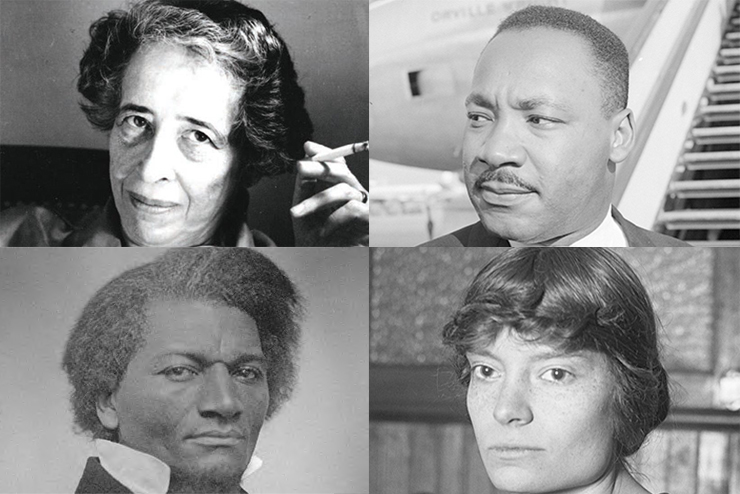Two years ago, Gracy Olmstead, a journalist who writes on farming and farming communities, partnered with Intercollegiate Studies Institute (ISI) to compose a list of those whom she and the Institute view as “conservatives.” Of the now deceased figures who appear on Olmstead’s list, very few of them have any connection to anything identifiably conservative. Martin Luther King, Jr., Frederick Douglass, and the Catholic socialist Dorothy Day would likely have been puzzled to find themselves on such a list of commendable conservatives, as would Hannah Arendt. Although I admire Arendt for her study of totalitarianism, I have no idea in what sense she was a conservative—she certainly went ballistic when the GOP nominated Goldwater in 1964.
Yet Olmstead tries to get around this classificatory problem by telling us the following:
Several of the thinkers, activists, and writers listed above were viewed as progressive during their lifetime because of their willingness to critique and call out corruption, to question the powerful, and to come alongside the vulnerable and disenfranchised. But a conservatism that will truly last and build a beautiful legacy must draw these people into its canon and learn from them.
This admission got me to thinking about whether Olmstead is confusing two categories of human beings who should be kept distinct: those whom she personally likes and those who belonged to the right. Like ISI, Olmstead is not necessarily on the right but trying to use the “conservative” label to describe those whom she thinks we should approve of.
But describing past figures who in no way considered themselves to be conservative is not quite fair. How many of Olmstead’s paradigmatic conservatives defended the kind of organic, hierarchical society that Edmund Burke held up as a countermodel to revolutionary France? And if they did not, what exactly characterized them as conservative as opposed to something else?
The tendency to shoehorn famous thinkers into the conservative mold, particularly in the case of Martin Luther King, Jr., was recently called out by black nationalist Leonard Pitts. In a noteworthy column Pitts noted that conservative politicians and columnists never go beyond one or two usable sentences in King’s “I Have a Dream” speech before they dishonestly claim him as one of their own. Contrary to the parroted rhetoric on Fox News, King explicitly favored quotas for blacks, raged against white systemic racism, and considered himself a socialist. When such race-conscious Republican Congressmen as Jack Kemp and Newt Gingrich pushed to create a MLK national holiday in 1983, President Reagan understandably balked, before reluctantly accepting the proposal. Needless to say, the perpetually leftist media went crazy pushing the idea and condemning anyone who opposed it for any reason as a “racist.”
I am not defending Pitts’s corrections as a paleoconservative reaction to the conservative establishment’s predictable misrepresentation of King. I bring it up to illustrate the mistake of presenting people as what they definitely were not. There are usually compelling reasons why those who have identified themselves explicitly with the left continue to be viewed in that way. That is how those figures wished to have others see them, and it is foolish to attach labels that they would have properly rejected.
That does not mean that I as a non-leftist should disrespect these people if they indeed showed a willingness “to critique or call out corruption.” For example, I respect Karl Marx as a brilliant social analyst. I have learned a great deal from reading his historical writings and his correspondence with his fellow-socialists. But that does not mean that I should consider that Marx was some type of conservative. What it does mean is that, like others on the right, I find value in Marx’s insights and associate their source with an older and less demented left than the one we are now combatting. But of course, I won’t try to pull the wool over anyone’s eyes by mispresenting Marx as a shining example of conservatism.
Olmstead also makes a point of telling us that those who were involved in the “enslavement of African people” can have no place at her conservative table. Does that mean that George Washington, John Randolph, Robert Lewis Dabney, John Witherspoon, and many other early Americans, who owned slaves and, in some cases, even defended the practice of slavery, cannot be considered conservative? Although we are well rid of slavery, which unfortunately has given way to even more shocking outrages like giving sex change hormones to school children, human bondage was long held to be necessary for material survival and even for the cultivation of the higher arts. In a less developed economy that may well have been the case. Should I deny the conservative label to all those early Americans who kept as slaves the descendants of Africans? Perhaps I should also be anachronistically condemning all slaveowners (which include Aristotle, Cicero, Plato, the Hebrew Patriarchs, St. Paul, and many other ancients) for having lagged behind Gracy Olmstead on this moral issue.
I am not mocking anyone by asking these questions. But I am suggesting that those who embrace any aspect of our politically correct culture may not be able to judge who is or is not conservative. Olmstead urges conservatives to consider history without “nostalgia and carelessness.” Are historians allowed to look at it without yielding to spasms of remorse?
Clockwise from upper left: Hannah Arendt (Ryohei Noda/Flickr) Martin Luther King, Jr. (Cees de Boer/Wikimedia Commons); Frederick Douglass (MET museum, Wikimedia Commons); Dorothy Day (Blanchethouse, Wikimedia Commons) CC BY-SA 4.0
